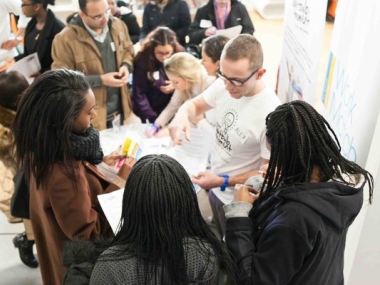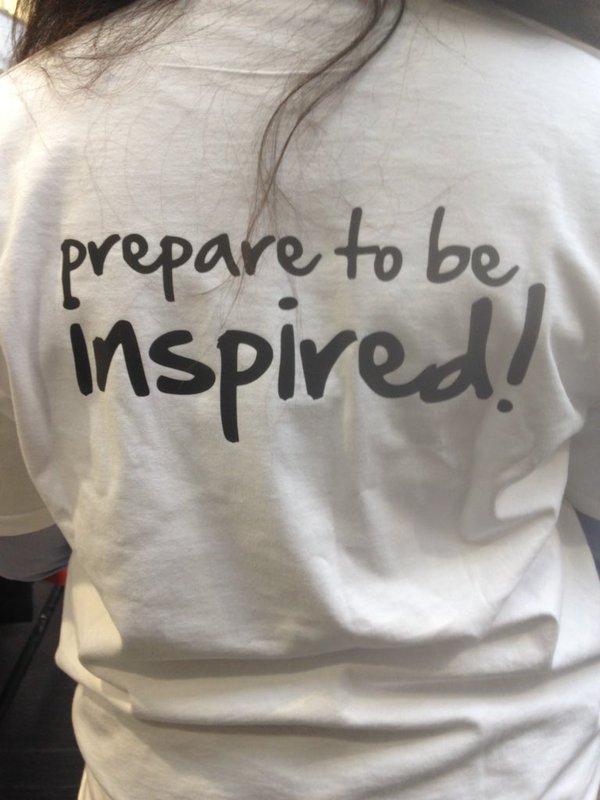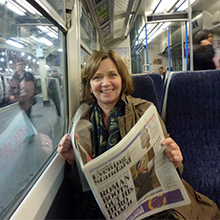Inspiring the next generation of entrepreneurs - A review of the first Westminster Enterprise Week
Edited on
28 October 2019Earlier this year URBACT published the results of its latest capitalisation initiative which included a focus on Youth and Jobs through the 'Job Generation for a Jobless Generation' workstream. The central enquiry was: 'What can cities do to grow jobs for young people?' It explored the changing face of 'work' and 'jobs' and looked at how cities can more effectively engage employers - and young people - in delivering on this important issue.
Article co-authored by Sally Kneeshaw and Alison Partridge

Through our involvement in the workstream - and other projects related to enterprise and entrepreneurship - we (Sally Kneeshaw and Alison Partridge) have deliberated on the potential role of city authorities and their margins of manoeuvre in an area which, many would argue, is dominated by national policies and macro economic factors. We have written on more than one occasion about the challenges of engaging employers and creating a better understanding what the world of work will actually look like in future for the young people of today.
Over the past few months we have had a unique opportunity to challenge our thinking through our contribution to the inaugural Westminster Enterprise Week, which took place between 16th and 20th November 2015. Here we share some of our experiences with others seeking to help young people better understand their employment and entrepreneurship options.
Inspiring enterprising youth
By launching Westminster Enterprise Week Westminster City Council aimed to connect young people to the world-class enterprise opportunities on their doorstep and ultimately inspire the entrepreneurs of the future.
During the week, nearly a thousand students from Westminster schools and colleges visited innovative businesses including Bafta and Oscar award-winning studios, toured Westminster’s co-working spaces, incubators and accelerators, took part in masterclasses and workshops, and even had the opportunity to pitch their business ideas to former BBC TV Apprentice advisor, Margaret Mountford.
We (Sally and Alison) were appointed to project manage the Week, curating the programme, engaging with businesses, schools and other stakeholders to pull together and manage an ambitious programme. As this was the first time that Westminster had hosted an Enterprise Week a comprehensive monitoring and evaluation system was developed, so that lessons could be learnt about the return on investment and how to improve in future.
So was it worth it? How did it compare with some of the theory and experiences from elsewhere in the EU? And what are lessons for other cities?
Why an Enterprise Week?
Earlier this year the City of Westminster launched its Enterprise Action Plan for the next 5 years. One of the priorities is entitled 'Inspiring Young Enterprise', and includes a commitment to launch a Westminster Enterprise Week to engage young people and businesses in enterprise promotion activities. The 1st week was timed to coincide with Global Entrepreneurship Week 2015, the world’s largest entrepreneurship campaign. The key message this year was ‘Make it Happen’ to encourage participants to do just one thing to become more entrepreneurial. Westminster became an official programme partner.
Extending unique economic opportunities to all
We should acknowledge here that Westminster is an extraordinary part of the London and UK economy, producing 3.1% of national GVA (Gross Value Added)[1] in a physical area of just eight and half square miles. It is 1 of the 32 boroughs that make up London and yet Westminster’s economy generates 2.2% of the Gross Domestic Product for the UK, about £16 billion[2] It is home to the headquarters of many major companies, to large construction and infrastructure projects, the heart of central government and to Oxford Street, Soho, theatres, museums, and tourist landmarks.
But not all local residents benefit from this world class landscape. Overall in Westminster 32% of secondary school children have free school meals (a standard indicator of deprivation) and for 64% English is not their first language.[3] An explicit ambition of the week was to bring young people from schools in less advantaged parts of the city to have opportunities that would otherwise be unavailable to them.
 An ambitious programme
An ambitious programme
We started planning for the week in July and developed an ambitious programme of diverse activities. Entrepreneurs went in to a number of schools and colleges to deliver assemblies and talks, but most events took place off site, with groups of students travelling to visit business and enterprise agencies. The line-up was as follows:
An innovative pilot enterprise programme for 16-18 year olds at one of the local schools including:
- Comprehensive 'Pitch Me' training to help young people to effectively identify and articulate their business attributes and ambitions
- Support with business networking skills and guidance on business plan development
- Dragon's Den style pitch to a high profile panel of entrepreneurs and business leaders
- Awards of up to £1000 investment; membership of a co-working space and ongoing support from a dedicated business mentor.
An afternoon 'Your Lightbulb Moment' enterprise training session run by the Bright Ideas Trust for 16-18 year olds. This included an 'Ignition speech' from Saira Khan an ex candidate on the BBC's Apprentice, workshop sessions on access to finance, cash flow management, branding, Westminster's youth enterprise offer and a 'pitch corner' with BBC's Apprentice advisor Margaret Mountford where young people had an opportunity to get feedback on their emerging business ideas.
It is great to see a local authority that is so focussed on nurturing the entrepreneurial spirit of young people. Support from councils is invaluable for achieving the great future that these young people strive for and it’s encouraging that they’ll have the opportunity to seek help and advice from Bright Ideas Trust and other industry experts
Margaret Mountford
Breakfast roundtable on youth entrepreneurship bringing together people from local enterprise agencies, business support providers and co-working spaces to exchange experiences on what works and what doesn't.
Guided visits of the city's many enterprise agencies and co-working spaces (Impact Hub Westminster, Made at Somerset House, Great Western Studios, TrueStart Retail, Maida Hill Place and #Venture382).
Open House visits to thriving creative industries companies in Soho including the makers of Gravity Framestore, Microsoft Lift London and MPC through Soho Create
I enjoyed how Microsoft LIFT presented the company through their personality, teamwork. Visiting the work environment I found out about how people work on projects.
Student visiting Microsoft
A Workshop on the Pop Up Economy and Food Entrepreneurship at Westminster's Food Incubator - Maida Hill Place
A programme of special youth focused events at Impact Hub Westminster (including a Community Lunch) with the spotlight on Social and Environmental Entrepreneurship.
A programme of special youth focused events and activities at the city's four Business Information Points, based in libraries, including a masterclass on Pitching Your Business Idea.
Inspiring Enterprise Assemblies in the city's 11 secondary schools where local entrepreneurs told their stories and shared some of the lessons learnt along the way.
An evening Reception bringing together the business community to celebrate the inaugural Westminster Enterprise Week.
This was a fantastic project, it has taught me teamwork skills and many things such as how to pitch. We got to create and think of our own business.
PitchMe programme student
Lessons for the future
The high ambition was delivered. Nearly a thousand 14-18 years olds, and more than 20 organisations took part in over 30 activities. We estimate that around 750 hours were donated by participating businesses preparing for and hosting young people. Putting a financial value on this is almost impossible, but even at modest hourly rates we are talking about tens of thousands of euros worth of voluntary support.
There were several practical lessons learnt, for instance about timing. It takes longer than you think to get a group of teenagers across central London! Many of the sessions had been scheduled for one hour, and in fact that is not enough. They almost all overran with more time needed for questions, tours and feedback.
The most impactful parts of the programme, the ones where students go out of the school or college environment, to tour a business space and meet real business people, require the most organisation, in terms of brokerage, health and safety, security, registrations etc. There is a lot of extr a work involved. In addition teachers and college staff have an important role to play in helping their students frame their questions and having the confidence to ask them.
a work involved. In addition teachers and college staff have an important role to play in helping their students frame their questions and having the confidence to ask them.
In our previous work on what cities can do to encourage good conditions for job creation, it was always held to be the case that engaging employers is challenging, because they are too busy running a company, and have competing demands on their time, so are less likely to be open to city-led initiatives. In the case of Westminster Enterprise Week the opposite happened. All businesses and enterprise agencies involved were immediately responsive and enthusiastic about the concept of the Week, and went to great efforts to welcome and inspire the young people. We believe we were pushing on open doors thanks to the pre-existence of a local ecosystem of strong relationships and mutual trust developed over the last decade by the City’s Enterprise Team.
On the other hand it proved much tougher to convince the schools to participate. It seems that central London schools are overwhelmed with offers, and that it is difficult for them to arrange class cover or release teachers to accompany groups. The pressure on academic results means they are reluctant to lose precious curriculum time. We were left wondering if there were lessons that could be learnt from other cities here, particularly from Scandinavian countries where teacher training on entrepreneurship and support with the school-to-work transition seem to be more common and where the concept of education seems to embrace the world of work alongside the curriculum.
It was very worthwhile to be giving a group of young people the opportunity to learn about what people are currently doing in the creative industries.
Somerset House Trust Host
Westminster Enterprise Week took place during the week of 16-20 November, immediately after the horrific terrorist attacks in Paris and amidst profound reflection on alienation and radicalisation of Muslim youth. For us it represented the type of practical action we can be taking in the face of these challenges. The demography of schools in central London reflects the growing diversity of the capital, similar to many other European cities. Well over 70% of the students participating in the week were of minority ethnic and/or migrant backgrounds, from across Europe, from Asia, Africa, the Caribbean, the Far and Middle East. The difference between the make-up of the groups of young people and the predominantly White British hosts and organisers was stark. This is the next generation of entrepreneurs and leaders, and we need to inspire them to step up. Bringing these young people to talk to world class businesses, to network, to develop their ideas together is the best way to show them that have a place at the heart of the economy, and a stake in the country that needs their talents and skills.
Most important of all is the impact the experience had and will continue to have on young people. Of course it is impossible to measure the precise impact on young lives, without tracking into the future. But from the feedback it is clear that there were some life changing moments, when young people caught a glimpse of their future, working in some of the businesses they saw, and starting up with their own ideas. The student and business feedback has been consistently positive, with the average event rating overall being 8/10.
The pitch opportunity was fantastic. It actually really motivated me to start sharing my product with a lot of people. So, thank you for encouraging me.
My Lightbulb Moment Student
Transferability to other cities
Clearly not all EU cities have the level of diverse economic activity of central London. But we believe that all cities can take steps to help young people to better understand the options and local opportunities that the future holds. For other cities considering such an initiative the advice would be that it takes a lot of coordination, and depends on the goodwill of business and schools. We owe it to our young people, who often feel anxious about uncertain futures, to support their aspirations and inspire them to work hard towards their dreams. For us and the Westminster team the qualitative feedback from students, businesses and partners has been the best reward.
Check out the Film of the Week!
Young People are also the core focus of one of the newly selected networks under URBACT III - Gen-Y-City which aims to support innovative entrepreneurs Generation Y Generation through enhanced cooperation between science, local government and business.
[1] City of Westminster Economic Report 2011
[2] City of Westminster Core Strategy 2011
[3] Department for Education
 Submitted by Sally Kneeshaw on
Submitted by Sally Kneeshaw on




